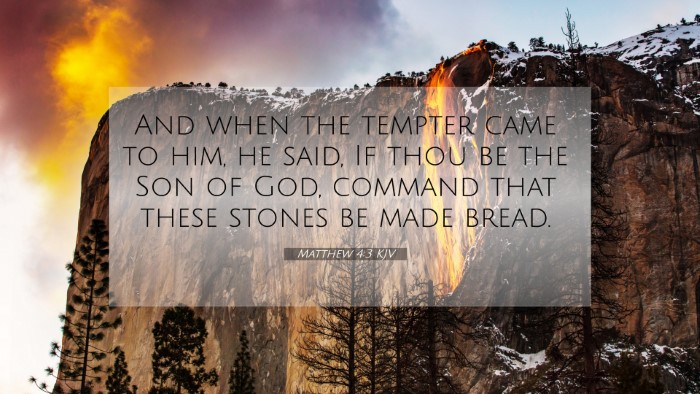This section features a detailed cross-reference designed to enrich your understanding of the Scriptures.
Below, you will find carefully selected verses that echo the themes and teachings related to Matthew 4:3 KJV. Click on any image to explore detailed analyses of related Bible verses and uncover deeper theological insights.
 1 Thessalonians 3:5 (KJV) »
1 Thessalonians 3:5 (KJV) »
For this cause, when I could no longer forbear, I sent to know your faith, lest by some means the tempter have tempted you, and our labour be in vain.
 Genesis 3:1 (KJV) »
Genesis 3:1 (KJV) »
Now the serpent was more subtil than any beast of the field which the LORD God had made. And he said unto the woman, Yea, hath God said, Ye shall not eat of every tree of the garden?
 Numbers 11:4 (KJV) »
Numbers 11:4 (KJV) »
And the mixed multitude that was among them fell a lusting: and the children of Israel also wept again, and said, Who shall give us flesh to eat?
 Revelation 12:9 (KJV) »
Revelation 12:9 (KJV) »
And the great dragon was cast out, that old serpent, called the Devil, and Satan, which deceiveth the whole world: he was cast out into the earth, and his angels were cast out with him.
 Luke 22:31 (KJV) »
Luke 22:31 (KJV) »
And the Lord said, Simon, Simon, behold, Satan hath desired to have you, that he may sift you as wheat:
 Revelation 2:10 (KJV) »
Revelation 2:10 (KJV) »
Fear none of those things which thou shalt suffer: behold, the devil shall cast some of you into prison, that ye may be tried; and ye shall have tribulation ten days: be thou faithful unto death, and I will give thee a crown of life.
 Psalms 78:17 (KJV) »
Psalms 78:17 (KJV) »
And they sinned yet more against him by provoking the most High in the wilderness.
 Job 2:4 (KJV) »
Job 2:4 (KJV) »
And Satan answered the LORD, and said, Skin for skin, yea, all that a man hath will he give for his life.
 Job 1:9 (KJV) »
Job 1:9 (KJV) »
Then Satan answered the LORD, and said, Doth Job fear God for nought?
 Matthew 3:17 (KJV) »
Matthew 3:17 (KJV) »
And lo a voice from heaven, saying, This is my beloved Son, in whom I am well pleased.
 Hebrews 12:16 (KJV) »
Hebrews 12:16 (KJV) »
Lest there be any fornicator, or profane person, as Esau, who for one morsel of meat sold his birthright.
 Exodus 16:3 (KJV) »
Exodus 16:3 (KJV) »
And the children of Israel said unto them, Would to God we had died by the hand of the LORD in the land of Egypt, when we sat by the flesh pots, and when we did eat bread to the full; for ye have brought us forth into this wilderness, to kill this whole assembly with hunger.
 Acts 9:20 (KJV) »
Acts 9:20 (KJV) »
And straightway he preached Christ in the synagogues, that he is the Son of God.
 Luke 4:3 (KJV) »
Luke 4:3 (KJV) »
And the devil said unto him, If thou be the Son of God, command this stone that it be made bread.
 Luke 4:9 (KJV) »
Luke 4:9 (KJV) »
And he brought him to Jerusalem, and set him on a pinnacle of the temple, and said unto him, If thou be the Son of God, cast thyself down from hence:
 Matthew 14:33 (KJV) »
Matthew 14:33 (KJV) »
Then they that were in the ship came and worshipped him, saying, Of a truth thou art the Son of God.



















